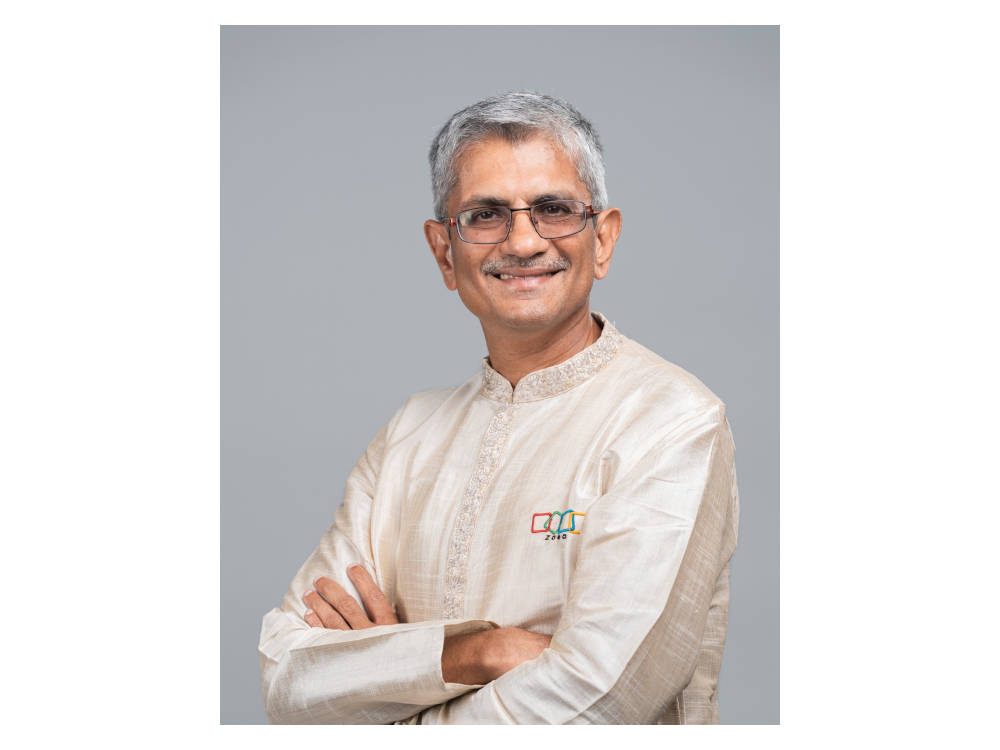[Shailesh Davey, Zoho co-founder, succeeded Sridhar Vembu as CEO in January 2025]
In 2001, shortly after joining Zoho (then AdventNet), Girish Mathrubootham, who would go on to found Freshworks, sat down with his new boss to chart out his early days in the role. Mathrubootham had only a broad understanding of the company and its goals. He knew little about its products, processes, or people.
His boss, a lean, bespectacled man, just a few years older, asked Girish to start answering customer support questions. “That’s the fastest way to learn the product,” he said.
Girish was surprised. It was like the way kids learned swimming in villages: the elders threw them into the community well. “No introductions, no HR welcome packets, no glossy training manuals. Just a direct shove into the deep end. Sink or swim,” Girish wrote in his memoir All In.
By doing so, “he forced me to engage with the product at a level no formal training program could have matched,” Girish reflected in his book. “More than anything, [he] wanted me to take ownership. He wasn’t just asking me to understand WebNMS (the company’s main business at that time); he was challenging me to own it.”
A Steady Climb
His boss was the Vice President of Engineering, Shailesh Kumar Davey. Shailesh is now the group CEO of Zoho, having taken over the role from Sridhar Vembu this January.
Back in the mid-1990s, Sridhar, his brothers Kumar and Sekar, Tony Thomas, and Davey founded Zoho to build software products. Their first customers were Japanese printer manufacturers. By 2001, the company had about 120 employees, and not a single SaaS product, which would later become its hallmark. Today, Zoho has over 18,000 employees, 40+ SaaS offerings, more than 120 million users, and annual revenue exceeding $1 billion.
Much of this growth, Zoho’s leaders say, can be traced to the company’s unconventional culture, reflected in Mathrubootham’s onboarding. It’s a belief that you learn something by actually doing it, that you need freedom to do it, an acceptance of mistakes, patience, and ultimately, the awareness that it’s the customer who gives the verdict, by buying or walking away.
They didn’t develop these convictions from reading books. Their convictions came from “the school of hard knocks,” as Rajendran Dhandapani, Zoho’s seventh employee and a key member of its leadership team, puts it.
The Road Ahead: Navigating AI Disruption
Now, the SaaS industry itself is facing some of its hardest knocks since its inception 25 years ago. After years of steady expansion, the SaaS industry is now in flux. Competition has intensified, first by too much investor money flowing into it, and now by too little. Customers are overwhelmed with the sheer range of products they have to subscribe to, with some questioning the cloud model itself.
The biggest shockwave yet comes from AI.
In December 2023, Microsoft CEO Satya Nadella declared SaaS dead, defining it as business logic residing on the cloud. He predicted that Agentic AI - semi-autonomous AI systems capable of interacting with the real world and performing sequences of tasks on behalf of users - will do what SaaS has traditionally done. SaaS companies must learn to swim in this AI-driven world, or sink.
Zoho isn’t starting from scratch. It has been working on AI for more than a decade. It launched its AI product Zia in 2015. Besides, its deep engineering culture, long-term orientation, and frugal, grounded ethos could be significant advantages in an AI-first world. And Davey, who is now at the helm, combines technological depth with the ability to build and lead resilient teams.
Like Sridhar Vembu, Davey he is an engineer by instinct and by training. He also went to IIT Madras. He continues to code regularly, thinks long-term, and doesn’t get easily distracted by hype cycles. Tony Thomas, a fellow co-founder and passionate technologist himsef, credits Davey with bringing exceptional engineering rigour to Zoho in its formative years. Prabhu Ramachandran, CEO of Facilio, who worked in Zoho for over 18 years before starting up on his own, calls him “one of the best technologists and one of the best people managers” he’s known—“a rare combination.”
That rare combination may be exactly what Zoho needs now, as it seeks to reinvent itself once again.
Which is why Founding Fuel sat down with Davey for a wide-ranging conversation, on navigating disruption, building for the long haul, empowering teams, and confronting the AI future.
Here are edited excerpts from that interview, distilled into three sections and 11 key insights.
A Complex World
Zoho’s response to the current wave of AI disruption isn’t happening in a vacuum. The company has been here before, in different forms, under different pressures. Its early survival through the dot-com and telecom crash shaped a culture that values decentralisation, long-term thinking, and learning by doing. The crisis forced Zoho to pivot, reorganise, and trust its people to build new products and find new markets, traits that are just as relevant today.
“How many crises have you seen?”
It’s a question startup founders often ask one another. Because some forms of wisdom come only through surviving upheaval, and knowing when and how to reinvent.
On navigating the 2001 crisis
In a startup, you need to have some faith, bordering on irrational faith, I would say. You prepare for the worst, embrace your worst fears, and then you maintain some faith in what you're doing.
Leading up to 2001, a lot of our customers suddenly started going out of business. The market knowledge coming in from the U.S., where we were hit hard, was crucial, and the message was clear: we had to pivot.
What we did was continue executing the product that was generating revenue, because we knew customers depended on it; we didn’t just slash it. But a good number of people started working on the next domain. The whole team structure changed. You might’ve been managing 20–25 people, and suddenly the team was split into four different product groups.
It was a challenging period. Deal sizes in the new market were one-tenth of what we were used to, so we restructured the sales process. We even had to let go of some people in the US, especially in sales, something we had never done before. People accepted the changes, and I would say that was largely because of faith. That’s what helped us see through 2001.
On organising like a federation
Zoho isn’t a very centralised operation. It’s more like Switzerland, a union of semi-autonomous states. Some things, like engineering platforms and global sales, are centralised to keep us consistent. But within that, teams have the freedom to operate independently, with responsibility.
Personally, I see the organisation as a platform. People come in, build something of value, and customers validate that by paying. That’s all that matters.
At the end of the day, it’s a conversation between you and your soul. Did you do a good job? Forget the pay, forget what your manager said. Can you go to bed satisfied?
That principle shapes how we work. If something is running well, don’t interfere. Mistakes are fine, as long as you don’t repeat them. Making mistakes is an engineer’s birthright, but never the same one twice.
We also believe that if a highly paid person is managing another highly paid person, one of them is unnecessary. Most of our senior leaders are engineers, not managers.
On leading as a collective
One of our biggest strengths is decentralisation. Most of us have worked together for 15-20 years. We know each other’s strengths and weaknesses.
That’s why we split roles. Meeting a customer, even in India, can take one or two days. So someone needs to focus externally, someone internally, and someone has to balance the two.
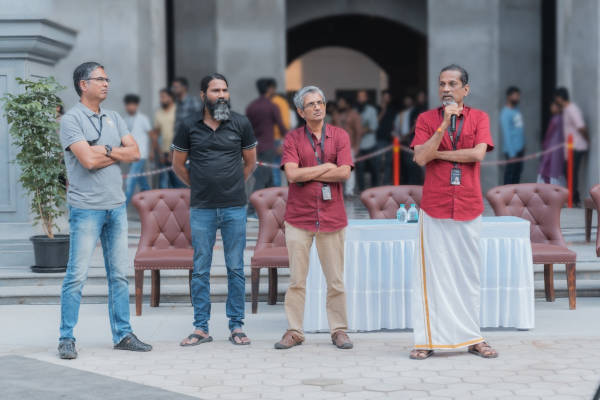
[The new leadership team, Rajesh Ganesan (CEO, ManageEngine) Mani Vembu (CEO, Zoho.com), with Shailesh Davey and Sridhar Venbu]
Rajesh Ganesan and Mani Vembu now take on more external-facing roles. Rajesh has always been close to ManageEngine’s customers and partners (ManageEngine is Zoho’s enterprise IT management software division), and Mani is doing the same. Sridhar and I focus more on internal systems and how AI can be embedded deeper into the organisation.
In the US, Tony and the team are replicating this model, so we can better engage larger enterprise customers there.
Rewriting the Playbook Again
Zoho’s resilience was forged in crisis, but its future will depend on how it navigates a much bigger shift: the rise of AI. Unlike previous disruptions, AI doesn’t just threaten business models. It challenges how people learn, how they work, and how decisions are made. And it’s forcing even engineering-led firms like Zoho to re-examine the very foundations of their product design, team productivity, and organisational knowledge.
Earlier this year, when Sridhar Vembu stepped down as CEO to take on the role of Chief Scientist, his message to the team was characteristically sharp: “It’s important to focus on AI. Everything else is Mayai [illusion].”
In a company that’s always believed in doing things differently, this wasn’t just a symbolic shift. It was a signal that Zoho is preparing to rewrite its playbook again, this time for an AI-first world.
AI Disruption
AI is as big a shift as the internet, perhaps even bigger. It's reshaping industries, reconfiguring how we work, how we write code, and how we learn. For a company like Zoho, which has always bet on internal capabilities and long-term thinking, it presents both a challenge and an opportunity. Some forms of work may disappear entirely. But much about AI is still unclear, which makes missteps easy and course correction critical. That’s why Zoho is approaching it with the same clarity and conviction that has marked its journey so far: start with the customer, learn by doing, and build what truly adds value.
On using AI
We've been investing in AI for the last 10 years, including classical machine learning, deep learning, and transformer architectures. Since we operate in the B2B space, we understand the problems we are solving. Therefore, we can scope what the AI model should do to prevent it from performing random or unintended actions.
Knowing we are in this B2B context, we embed AI into our products wherever it makes sense for our end-users. But we're careful. For high-impact decisions, explainability is critical. For instance, if you're using AI to shortlist resumes, you need to be able to explain why a particular resume was dropped. In contrast, if you're using AI to determine the best time to contact a customer, the impact of an error is lower.
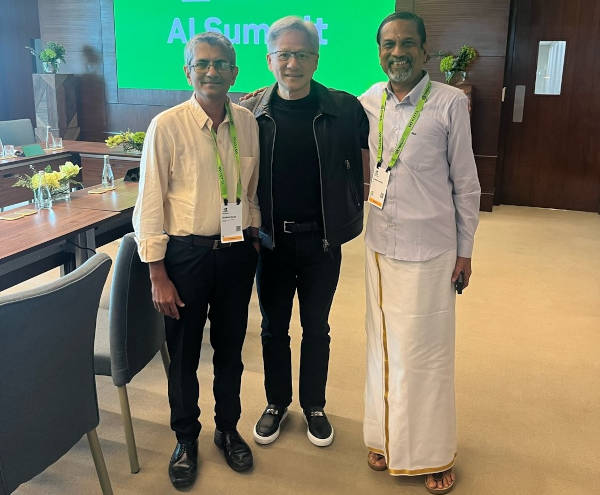
[Davey and Sridhar Vembu with Nvidia CEO Jensen Huang]
Just because some technology is flashy, it doesn't mean we must take it, put it in our product, and tell customers to pay for it. Given that we have been in the market for 25-26 years, we believe we have a sensible take on this. Whatever makes sense, we incorporate.
On AI as a copilot
AI is a very good assistant; that's why the 'copilot' concept works really well. If you have a doubt, you can use it to question your own understanding. We see this in our own teams.
For instance, in customer support, when a question comes in, an AI prepares an answer based on all prior interactions with that customer and our knowledge base. The support agent can then review this prepared answer and send it. In this way, an agent might be able to handle twice the number of questions.
But does it work every time? No. Sometimes, the AI generates something that needs to be entirely deleted, and the agent has to type their own response. In that sense, the agent is reviewing it for us; we still haven't made it 100% automated.
Today, I would say the productivity gain is in the realm of 20-30%. The question is, will it remain there, or will it go further?
Beyond the Hype
While AI may dominate today’s headlines, Zoho isn’t letting it overshadow the bigger picture. The company remains focused on building durable, long-term capabilities across its business, quietly and methodically. In typical Zoho fashion, it resists the temptation of flashy pivots or quick wins. Instead, it continues to deepen its software offerings for vertical markets, expand its global presence through local teams, scale its rural operations, and invest in deep-tech startups that align with its values.
These aren’t side projects. They reflect a coherent philosophy: stay grounded, trust the process, and play the long game.
On building for vertical markets
Verticalisation is a reflection of an industry’s maturity. Initially, offerings might be very horizontal, but as the industry evolves, customers expect more specific value.
I think that’s what’s happening in SaaS. Earlier, just being on the cloud was a differentiator. But now, that’s the baseline, everyone’s there. The new challenge is time-to-market.
If it used to take five months to customise a solution, customers now want it in two. But verticalisation isn’t just about speed ,it’s about embedding industry best practices into the software itself.
That’s what we’re doing. We’re building vertical solutions that meet about 95% of customer needs. Earlier, a customisation might have covered only 80%. That extra 15% gives them faster deployment and embedded expertise.
On transnational localism
A big focus for us is what we call transnational localism. We now have offices in the US, Europe, Japan, the Middle East, and Latin America.
The model is inspired by what Korean companies did in India: leadership goes from the home country, but the local teams are hired entirely on the ground.
This helps us stay close to customers and invest in their communities. But it also raises the question: How do you protect culture?
Culture isn’t something you can document and teach. It has to be absorbed. That’s why we encourage frequent trips to and from India. People from global offices come here to work closely with our teams. One advantage is that these teams are small—50 to 100 people—so they build real camaraderie. That helps the culture carry forward.
On making rural expansion work
When we started, Chennai was our main office, so the gravitational pull was there. But the idea now is to gradually shift that gravity, to Coimbatore, to Madurai, and other places.
Zoho Schools is following a similar path, moving steadily into rural areas.
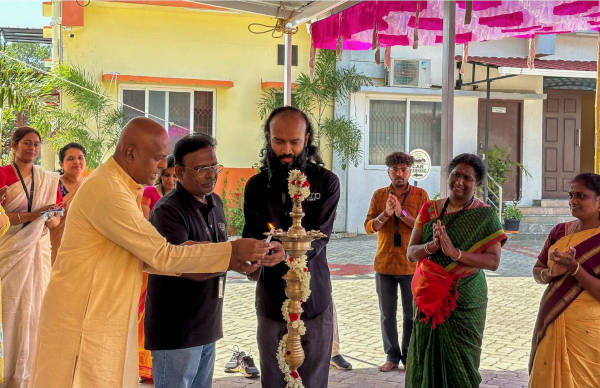
[Zoho Schools inauguration in Kumbakonam, Tamil Nadu]
But we’ve learned a few things. We had to shut down some rural offices because the number of people showing up kept falling. Just because 20 people come to an office doesn’t mean it functions like a team; if everyone’s working on something different, it’s just remote work in a shared space.
So, now we make sure that each rural office has a core team, a cluster working on the same product or problem. That cohesion makes a difference. Otherwise, it doesn’t work.
On deep-tech investments
We’ve invested in about a dozen deep-tech companies. One thing is clear, deep tech and hardware need patient capital.
Hardware takes time. That matches our long-term orientation.
But it’s not just about money. Our involvement is also hands-on, especially on the R&D and software side. Most deep-tech innovation is a blend of hardware and software. Take robotics, it's increasingly software-defined. We bring in that software depth.
Their engineers visit us, we consult regularly, and our R&D teams share whatever is relevant. The idea is to build an ecosystem, where startups benefit from our software expertise and we all learn from one another.
It’s a cross-pollination of engineering ideas. That’s what excites us.
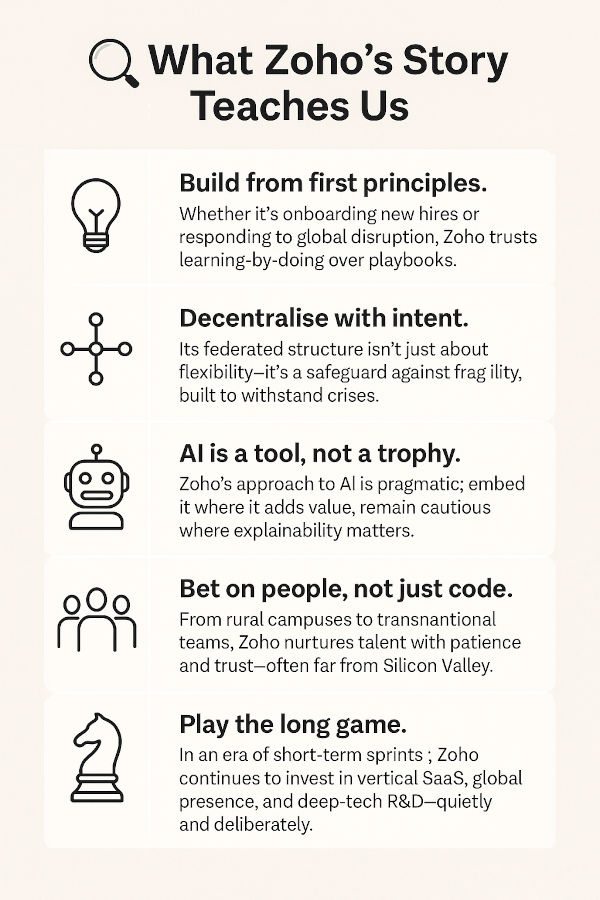
Dig deeper
The Contrarian: Sridhar Vembu built Zoho by questioning the conventional wisdom. For the longest time, no one took much notice. But now people are curious about what makes him, and Zoho, tick (Read time: 28 mins)

